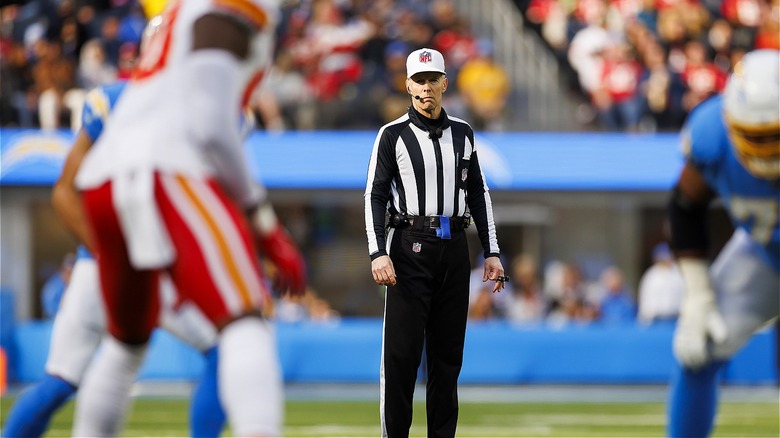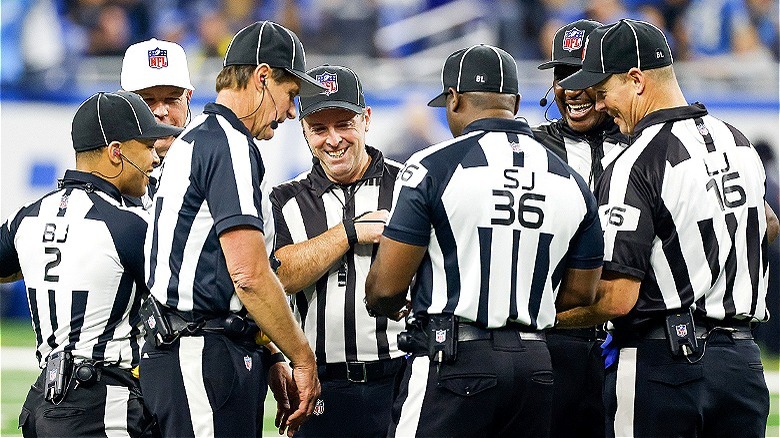How Much Do NFL Referees Get Paid?
While there's a lot to know about just how much NFL players make (especially in the playoffs and Super Bowl), you might find yourself wondering about the referees. While refs are by no means the most loved part of the league, they ultimately serve a vital function in the playing (and watching) of football games. While less well-known than commentators, players, and coaches, NFL referees can have a significant impact on a game. It's not surprising then that fan theories about officials "rigging" certain games in favor of NFL-preferred teams seem to grow with every football season. With the recent introduction of sports betting on a larger scale, refs are even influencing gambling prospects. While it's hard to prove intentional rigging, an NFL referee's stats (like a player's stats) for or against certain teams are now increasingly becoming part of the conversation, especially when it comes to assignment announcements ahead of important postseason games.
In 2019, the NFL and the NFL Referees Association reached a seven-year collective bargaining agreement, and you might be surprised to learn that, unlike NFL players, NFL referee salaries aren't publicly disclosed. This means the current pay for league officials isn't entirely known. However, expired collective bargaining agreements from the past can (and do) help us estimate how much referees currently make in an NFL season, at least until they negotiate a new agreement in 2026.
NFL referee pay during the regular season
Based on previous CBAs and calculations, the estimated average salary for NFL officials is around $205,000 per season, and with 17 games in a regular NFL season, that comes to a little over $12,000 per game. However, if you look at past collective bargaining agreements, it's clear that not only are NFL referees paid varying levels of compensation depending on their specific role on the field, but also based on their levels of experience and time with the league going into the season.
Given that $205,000 is an average, you can gather that referees with more experience, and thus in higher positions (like a head referee versus a line judge), earn more. According to Sporting News, a referee is paid an annual salary, not per game. This said, if selected to officiate playoff games, then an NFL referee can earn more, depending on the game they officiate. Also, it should be noted that referees are eligible for the NFL's pension program and 401(k) plan.
How much NFL officials get paid in the postseason
The NFL's postseason can lead to additional lucrative opportunities for referees. However, not all officials are selected to work playoff games. The league chooses its postseason and Super Bowl refs carefully, with the roles generally going to more experienced officials who've been with the league the longest. Since postseason and Super Bowl games come with additional financial bonuses, they can significantly change an NFL official's overall pay for the year. Referees selected for postseason games can expect bonuses ranging between $1,500 to $5,000 per playoff game they officiate. As for the big game? According to an analysis by Money, a referee officiating in the Super Bowl can earn (potentially) $30,000 to $50,000 (again, depending on the official's experience and their years with the league).
Note that officiating in the NFL isn't considered a full-time position. As such, NFL referees aren't entitled to traditional benefits, such as health care, since they only work, on average, between 20 and 30 hours a week. The NFL had previously played with the idea of transitioning some of its referees into full-time league employees but ended up abandoning the idea during CBA negotiations in 2019. Pundits, players, and even fans have all wondered if allowing refs to be full-time employees would help improve officiating throughout the league. In fact, even coaches and NFL team executives have agreed, and publicly stated, that the current NFL officiating system isn't working. As it stands now, most of the referees working for the NFL have full-time "regular" jobs that they can fall back on.


